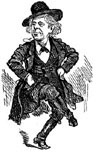
Theologians: Get With the Program!
EDITORIAL
At their annual meeting in November 1999, after an entire decade of at times contentious debate, the U.S. bishops finally approved an “Application” document for the papal constitution Ex Corde Ecclesiae (ECE). The Application document will, among other things, finally implement in the U.S. the long-standing Canon Law requirement that college and university teachers in the theological disciplines must “have a mandate from competent ecclesiastical authority” (Canon 812), that is, from the local bishop where they teach.
No one acquainted with how Catholic theology has been “done” over the past 30 years in the U.S. would ever have thought, however, that this would be the end of the story. Predictably, a number of “name” Catholic theologians announced in the wake of the bishops’ decision that they would not seek the mandate.
In the Jesuit magazine America (Feb. 12), the liberal Notre Dame theologian Fr. Richard P. McBrien stepped forward to explain why he would, in principle, never seek any episcopal mandate. McBrien’s article was no surprise, for no sooner had the bishops approved their ECE Application document on Nov. 17 than The New York Times (Nov. 18) was quoting him (among others) as declaring he would not seek the mandate “as a matter of principle.” Over the years McBrien has been a favorite source for the secular media for statements critical of Church positions. As holder of a prestigious theology chair at America’s best-known Catholic university, he has almost always been available to “question authority.” Thus the secular media have felt justified in crowing: “See, there is more than one authoritative position in the Catholic Church: Here is this distinguished Catholic theologian with a different viewpoint from that of the pope and the bishops!”
In 1996 the U.S. bishops’ Committee on Doctrine found McBrien to be an underminer of official Church teaching, and the very fact that McBrien continues to teach theology at Notre Dame is Exhibit A for why ECE and the bishops’ Application document of it have been so urgently needed for so long.
You May Also Enjoy
When I became a Catholic at the age of 67, I was a political liberal…
When John Paul II and Benedict XVI commanded the chair of Peter, conservative and orthodox Catholics knew the pope and Magisterium were their 'court of last appeal.' That privilege now belongs to liberal Catholics.
While the March of Dimes may do valuable work toward helping conquer birth defects, other unborn handicapped children are denied life because of its support of prenatal testing.

